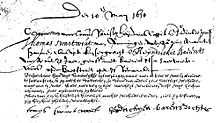Tomys Swartwout
Tomys Swartwout (born 1607 at Het Rech te Fath, Groningen, Netherland, baptized at Oude Kercke, Amsterdam, d. 1660 in Amsterdam) was one of the earliest importers of tobacco from New Netherland to Western and northern Europe, one of earliest settlers of New Netherland, and a founder of Midwood (Midwout), Brooklyn, New York.

Early exporter of tobacco from America to Europe
Tomys Swartwout was one of the earliest New Netherlanders to buy and sell American tobacco in the Netherlands. He started a wholesale tobacco business in Amsterdam, joining his older brothers Wybrant and Herman, in 1629.[1]
Early settler of America, founder of Midwood, Brooklyn, New York
Tomys Swartwout and family left Amsterdam for New Netherland in March 1652. Upon landing at Manhattan Island, they were greeted by Director-General Peter Stuyvesant, who expressed a desire to assist them in such ways as would enable them to settle upon a farm that they might select under his direction and approval. Tomys Swartwout, Jan Snedeker and Jan Stryker solicited from Stuyvesant the right to settle together on the level reach of wild land (de vlacke bosch) or flat bush, adjacent to the outlying farms at Breukelen and Amersfoort. Through Swartwout's suggestion, the settlement was given the name of the village of Midwout or Midwolde (Midwood). In April 1655, Stuyvesant and the Council of New Netherland appointed Swartwout a schepen (magistrate),[1] to serve with Snedeker and Adriaen Hegeman as the Court of Midwout. Being one of the original settlers of Midwood (Midwout) now Flatbush, on Long Island, Tomy's Swartwout was granted letters-patent by the Council of New Netherland, Director-General Stuyvesant, and the Dutch West India Company of 116 acres on April 13, 1655.[1][2]
"Humble Remonstrance and Petition of the Colonies and Villages of this New Netherland Province"
Swartwout was one of the nineteen signers of the "Humble Remonstrance and Petition of the Colonies and Villages of this New Netherland Province" sent to Director General Stuyvesant on December 11, 1653. Scorned by its recipient, this document is singularly important in the campaign for democratic rights in America. In the spirit of Adriaen Van Der Donck's Remonstrance of 1650 about governance of the colony, this one boldly sets out discontents about Stuyvesant’s authoritarian method of personally selecting, rather than electing, the council. The petitioners wished to be consulted and be allowed to give consent to the officials representing their interests. Stuyvesant eventually had to admit to the justice of this petition, and further, the statement is an important precursor of Jacob Leisler's campaign late in the 1680s for fuller representative democracy.[3][4]
References
- ↑ 1.0 1.1 1.2 The Swartout Chronicles
- ↑ "The register of New Netherland, 1626 to 1674". Archive.org. 2000-07-03. Retrieved 2013-11-26.
- ↑ The Common Law in Colonial America: Volume II: The Middle Colonies and the ... - William E. Nelson - Google Books. Books.google.com. Retrieved 2013-11-26.
- ↑ Invading Paradise: Esopus Settlers at War with Natives, 1659 1663 - Andrew Brink - Google Books. Books.google.com. Retrieved 2013-11-26.